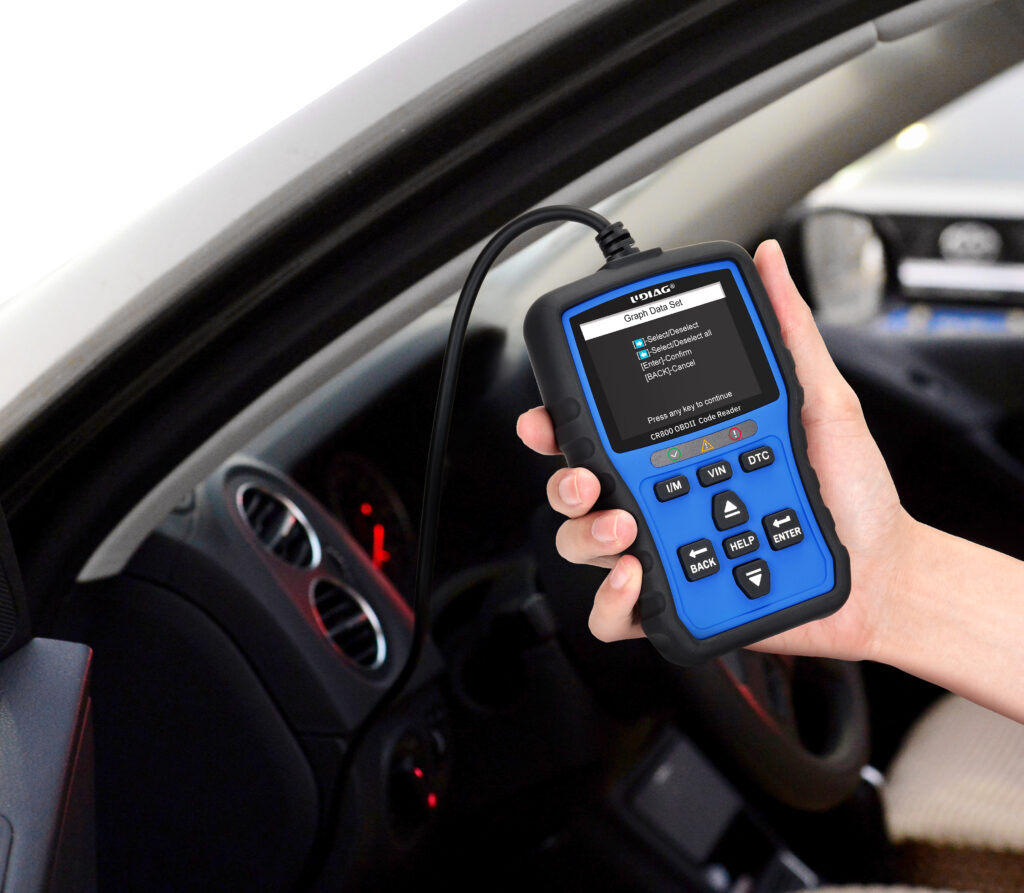OBDII Scanners in the Age of Electric and Hybrid Vehicles.
2023-11-12 by UDIAG
In the ever-evolving landscape of automotive technology, the advent of electric and hybrid vehicles has revolutionized the way we perceive transportation. As traditional combustion engines share the road with electric motors and hybrid systems, the need for sophisticated diagnostic tools becomes paramount. This article delves into the world of On-Board Diagnostics II (OBDII) scanners and their crucial role in navigating the complexities of these new-age vehicles.
I. Introduction
A. Brief overview of OBDII scanners
OBDII scanners, once a staple for traditional vehicles, have now become indispensable in the era of electric and hybrid cars. These devices plug into a vehicle’s OBDII port, providing real-time data and diagnostic information.
B. Evolution of vehicles: from traditional to electric and hybrid
The shift from conventional to electric and hybrid vehicles brings forth new challenges and opportunities for the automotive industry. OBDII scanners serve as a bridge, connecting these diverse vehicles to a common diagnostic language.
II. Importance of OBDII Scanners
A. Diagnostic capabilities
OBDII scanners are renowned for their diagnostic capabilities, offering insights into the health of a vehicle’s various components. For traditional vehicles, this meant monitoring the engine and emissions systems. However, with the rise of electric and hybrid vehicles, the scope of diagnostics has expanded significantly.
B. Maintenance cost reduction
One of the primary benefits of OBDII scanners is their potential to reduce maintenance costs. By identifying issues early on, vehicle owners can address problems before they escalate, preventing expensive repairs.
C. Environmental impact
In the context of electric and hybrid vehicles, OBDII scanners contribute to environmental sustainability. Efficient diagnostics lead to optimal performance, reducing emissions and promoting eco-friendly driving practices.
III. OBDII Scanners and Traditional Vehicles
A. Compatibility and usage
OBDII scanners have been a trusted companion for owners of traditional vehicles, offering compatibility with most models. Their ease of use and plug-and-play functionality make them accessible for DIY enthusiasts and professional mechanics alike.
B. Common issues and troubleshooting
For traditional vehicles, OBDII scanners have been instrumental in identifying common issues such as faulty sensors, misfires, and emission-related problems. The ability to troubleshoot these issues efficiently has been a game-changer in the world of automotive maintenance.
IV. Transition to Electric and Hybrid Vehicles
A. Emerging challenges in diagnostics
As vehicles transition to electric and hybrid technologies, new challenges arise in the diagnostic realm. Electric components, battery health, and intricate hybrid systems pose unique obstacles for traditional OBDII scanners.
B. Specifics of OBDII scanners for electric and hybrid vehicles
To address the evolving automotive landscape, OBDII scanners designed for electric and hybrid vehicles boast enhanced features. These include advanced battery health monitoring, integration with electric systems, and real-time data for hybrid components.
V. Features of OBDII Scanners for Electric and Hybrid Vehicles
A. Battery health monitoring
Electric vehicles heavily rely on batteries, making their health a critical aspect of overall performance. Specialized OBDII scanners provide detailed insights into battery condition, allowing users to assess their vehicle’s power source comprehensively.
B. Integration with electric systems
Unlike traditional vehicles, electric cars have intricate electric systems that demand specialized diagnostics. OBDII scanners for electric vehicles seamlessly integrate with these systems, offering a comprehensive view of the vehicle’s electrical health.
C. Real-time data for hybrid systems
Hybrid vehicles, combining internal combustion engines with electric motors, present a unique set of challenges. OBDII scanners tailored for hybrids deliver real-time data on both the traditional and electric components, ensuring a thorough diagnostic assessment.
VI. Perplexity of OBDII Scanners in the Age of Electric and Hybrid Vehicles
A. Complexities in diagnosing electric components
The integration of electric components adds a layer of complexity to diagnostics. OBDII scanners must navigate through intricate electrical systems to identify and interpret issues accurately.
B. Navigating through hybrid systems
Hybrid vehicles pose a perplexing challenge for OBDII scanners due to their dual nature. Effectively diagnosing issues in both the combustion and electric systems requires advanced algorithms and adaptability in scanning technology.
VII. Burstiness in OBDII Scanner Technology
A. Rapid advancements in OBDII scanner features
The world of OBDII scanners experiences burstiness, with rapid advancements propelling these devices to new heights. Manufacturers continuously introduce innovative features, ensuring compatibility with the latest vehicle technologies.
B. Adaptation to the changing automotive landscape
The burstiness in OBDII scanner technology reflects the industry’s ability to adapt to the changing automotive landscape. As vehicles evolve, so do the diagnostic tools, ensuring they remain relevant and effective.
VIII. Specific Challenges and Solutions
A. Overcoming diagnostic limitations in electric vehicles
Challenges in diagnosing electric vehicles include understanding and interpreting data from intricate electric systems. OBDII scanner manufacturers address these limitations through software updates and improved algorithms.
B. Enhancements for efficient hybrid system checks
Efficiently diagnosing hybrid systems requires enhancements in OBDII scanner technology. Real-time data synchronization, advanced sensor integration, and predictive analytics contribute to effective hybrid system checks.
IX. OBDII Scanners and Sustainability
A. Role in reducing vehicle emissions
OBDII scanners play a crucial role in promoting sustainability by identifying issues that contribute to increased emissions. Timely diagnostics and repairs help maintain optimal vehicle performance, minimizing environmental impact.
B. Promoting eco-friendly driving habits
Beyond emissions control, OBDII scanners contribute to eco-friendly driving habits. By ensuring the efficient operation of vehicle components, these scanners indirectly encourage responsible driving practices.
X. Consumer Awareness
A. Educating users about OBDII scanners
Despite their widespread use, some vehicle owners may be unaware of the benefits of OBDII scanners. Educating users about the importance of regular diagnostics fosters a proactive approach to vehicle maintenance.
B. Encouraging proactive diagnostics for all vehicle types
Consumer awareness initiatives should emphasize the relevance of OBDII scanners for all vehicle types, including electric and hybrid models. Proactive diagnostics empower users to take control of their vehicle’s health.
XI. The Future of OBDII Scanners
A. Anticipated developments in technology
The future of OBDII scanners holds exciting prospects, with anticipated developments in technology. Enhanced artificial intelligence, augmented reality interfaces, and integration with autonomous and connected vehicles are on the horizon.
B. Integration with autonomous and connected vehicles
As vehicles become more autonomous and connected, OBDII scanners will likely play a vital role in ensuring the seamless operation of these advanced systems. Integration with vehicle networks will become a standard feature.
XII. Benefits for DIY Enthusiasts
A. Empowering vehicle owners with diagnostic tools
OBDII scanners empower DIY enthusiasts by providing access to diagnostic information. Understanding a vehicle’s health allows owners to undertake basic repairs and maintenance, reducing reliance on professional services.
B. Cost-effective maintenance options
For DIY enthusiasts, OBDII scanners translate to cost-effective maintenance. Identifying and fixing issues early can save on repair expenses, making these devices a valuable investment for those who enjoy hands-on vehicle care.
XIII. Tips for Choosing the Right OBDII Scanner
A. Compatibility with electric and hybrid vehicles
When selecting an OBDII scanner, it’s crucial to ensure compatibility with electric and hybrid vehicles. Not all scanners are designed to handle the complexities of these advanced automotive systems.
B. User-friendly interface and features
A user-friendly interface is essential for both novice users and professionals. Look for OBDII scanners with intuitive displays and features that cater to your specific diagnostic needs.
XIV. Industry Perspectives
A. Insights from automotive experts
Experts in the automotive industry provide valuable insights into the role of OBDII scanners. Their perspectives shed light on current challenges, future trends, and the collaborative efforts between OBDII scanner manufacturers and automakers.
B. Collaborations between OBDII scanner manufacturers and automakers
Collaborations between OBDII scanner manufacturers and automakers drive innovation. Working together, these entities create solutions that align with the evolving needs of modern vehicles.
Conclusion
A. Recap of OBDII scanner evolution
The journey of OBDII scanners from traditional vehicles to electric and hybrid models highlights their adaptability and significance. As vehicles continue to evolve, OBDII scanners remain a constant companion in ensuring optimal performance and longevity.
B. Encouragement for embracing advanced diagnostic tools
In conclusion, embracing advanced diagnostic tools like OBDII scanners is crucial for every vehicle owner. Whether driving a traditional, electric, or hybrid vehicle, staying proactive in diagnostics contributes to a smoother, more efficient driving experience.
FAQs
1: Can I use the same OBDII scanner for both traditional and electric vehicles?
While some OBDII scanners offer broad compatibility, it’s essential to check for specific features catering to the unique diagnostic needs of electric vehicles.
2: How often should I perform diagnostics with an OBDII scanner?
Regular diagnostics are recommended, ideally as part of routine vehicle maintenance. Checking for issues early can prevent more significant problems down the road.
3: Are OBDII scanners user-friendly for individuals with limited automotive knowledge?
Yes, many OBDII scanners come with user-friendly interfaces, making them accessible to individuals with varying levels of automotive knowledge.
4: Can OBDII scanners help improve fuel efficiency in hybrid vehicles?
Yes, by identifying and addressing issues that affect fuel efficiency, OBDII scanners contribute to optimizing the overall performance of hybrid vehicles.
5: What should I look for when purchasing an OBDII scanner for my electric car?
Ensure compatibility with electric systems, battery health monitoring features, and real-time data for a comprehensive diagnostic experience.



